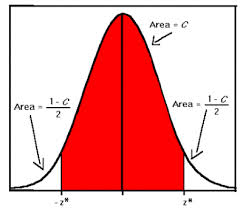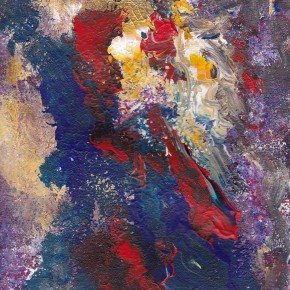Welcome, readers, to Synchronized Chaos’ May 2014 issue, where we explore the idea of confidence. A confidence interval is a concept in statistics referring to the accuracy of an estimate. Researchers can say they are pretty confident that the number they’re trying to find is within a certain range, known as the confidence interval.
As in statistics, we often find ourselves dealing with estimates and rough ideas in the human and larger natural worlds. We aren’t perfect, don’t know everything, and often possess too much, or too little, confidence, and aren’t sure how we fit into the larger universe.
So, these submissions explore various aspects of the broad, complicated concept of confidence.
Some look at the big picture, exploring how and what we know about the universe and our own minds.
Dr. Inez Fung’s lecture at Oakland’s Chabot Space and Science Center, written up by Cristina Deptula, looks at weather versus climate and what we can understand and predict about complex systems. Christopher Bernard presents a more personalized look at ecological issues through the life of a fictional man attempting to live using the smallest amount of natural resources possible, confident that his life and choices matter on a larger scale.
DanaLynne Johnson’s dramatic piece Toy Law also explores questions of our responsibility to the larger world, in a more personal context. Her speaker avoids speaking up about domestic violence at his neighbor’s home, when he could have made a difference, and finds himself facing consequences.
Other pieces focus on internal, psychological aspects of how we view ourselves and our capacity to deal with our world. Dr. Daniela Kaufer, UC Berkeley associate professor of integrative biology, looks at how acute and chronic stress affects our brains, and how we can mitigate those impacts. As she discusses, in a talk Cristina Deptula has reviewed, an optimal level of challenges in life can build up our ability to function as we figure out how to handle them, but overwhelming, intense stresses can cause physical damage to our bodies.
Austin Harrington shows us a writer whose sense of self is shaken by poverty, and returning poet David Cicerone illustrates the inner wisdom gained through a rip-roaring whirlwind of international travel escapades. Michelle Tholen’s luminous artwork highlights the effects natural landscapes have on us and our sense of who we are. We are reminded that we exist within, and are part of, a larger, natural world that was here before us, and will remain after our passing.
Sandy Hiortdahl’s poetry and prose piece also comment on our place in the universe and the persistence of memory, drawing upon history and mythology to evoke the personal and collective subconscious. Fresh, crisp details bring the ghost on the motorcycle and the fantastic opera house to life.
Rick Hartwell’s poetry explores the tension between fresh anticipation and disappointed hopes, and uses fog, muscled horses, and waves crashing against cliffs as jumping off points for his reveries. Nature here causes him to think, reminds him of who he is, and calls him back to a broader sense of life and his place in the universe.
Erik Stitt’s visual art is inspired by Native American motifs, the landscape of the American Southwest, and Western fantasy and science fiction. Stitt’s work reminds us that wonder, awe, and imagination are not solely the province of our culture and generation, but much more universal.
Walter Savage’s abstract paintings evoke human relationships and our connection to each other, which is another way in which people draw identity and confidence.
Elizabeth Hughes’ Book Periscope column reviews two novels with protagonists who gain confidence as they learn from life and make choices: Audrey from Michelle Carrithers’ Summer Justice and Dr. Pearl Stern, pioneering female physician in the 19th century southeastern United States, from Marie Bartlett’s Pearl, M.D.
In Kristian Wood’s short piece, the narrator gets up the courage to fly on an airplane. This fictional vignette reflects the author’s own experience of moving out on his own to start his life. Leticia Garcia-Bradford’s speaker also achieves a personal victory, taking her life back from a destructive relationship.
As with most things, including self-confidence, it is possible to go too far. Neila Mezynski depicts proud, self-assured men in her tone poetry, character sketches full of unique, telling details. Essayist Ayokunle Adeleye cautions against overconfidence in business, warning founders of enterprises not to gamble away what they cannot afford to lose.
Governments and larger social structures, as well as individuals, can possess destructive levels of hubris. Grace Chen’s novel Forget Me Not: A Love Story of the East, as reviewed here by Tony Longshanks le Tigre, illustrates the damage caused to individual lives and relationships by the Chinese Cultural Revolution, a time when the government believed it knew enough to manage an entire society through central planning.
Thank you very much for taking the time to read through this issue. We hope that by considering the meaning and value of each submission here, that we all will grow in our understanding of what it means to be a person here on this planet, to share the human adventure with many fellow travelers.
** Announcement, for the Synchronized Chaos family: A group of creative people in and around Hayward, California are starting a hackerspace, Hayhackers, which is an all-ages community center open to the public and should open up soon in the downtown. Hackerspaces are part of an international movement and are sprouting up all around the world. They are places where people can build things and work on electronics, computer, arts, crafts, sewing, creative writing, woodworking, photography etc type projects. You can come in, bring and share tools and do your own project, or join classes and workshops and networking events at the space.
Hayward is a multicultural, multigenerational and lower-income community with a lot of dedicated, interesting people but not a lot of industry or employment or safe places for people to gather. Hackerspaces in other cities have brought companies and industry leaders to town to meet people and consider investing in the community and bringing jobs to the area.
We’d love to see the Synchronized Chaos family get involved with Hayhackers and help them get off the ground. Please check out the website, www.hayhackers.org, which includes an interview with Synchronized Chaos author Ryan Hodge (Wounded Worlds). Hayhackers has regular Meetups at the Eko Cafe on B Street, Thursday evenings from 7-8 pm and all are welcome, even total non-techies, and especially those who want to volunteer! We’ll be at the Maker Faire in San Mateo, May 17-18th with science demonstrations for kids, and will be launching an IndieGogo fundraiser soon.
** Further announcement – the Hayward Library, 835 C Street, downtown encourages people to save the Earth and pass on a love of reading. They’re hosting a book giveaway, where people can bring gently used, well-read and well-loved books they’re willing to part with, to an event on their front lawn from 9-1 pm. They’ll give them directly to people of all ages who want to read them. I will be there myself and would look forward to meeting anyone who comes.




